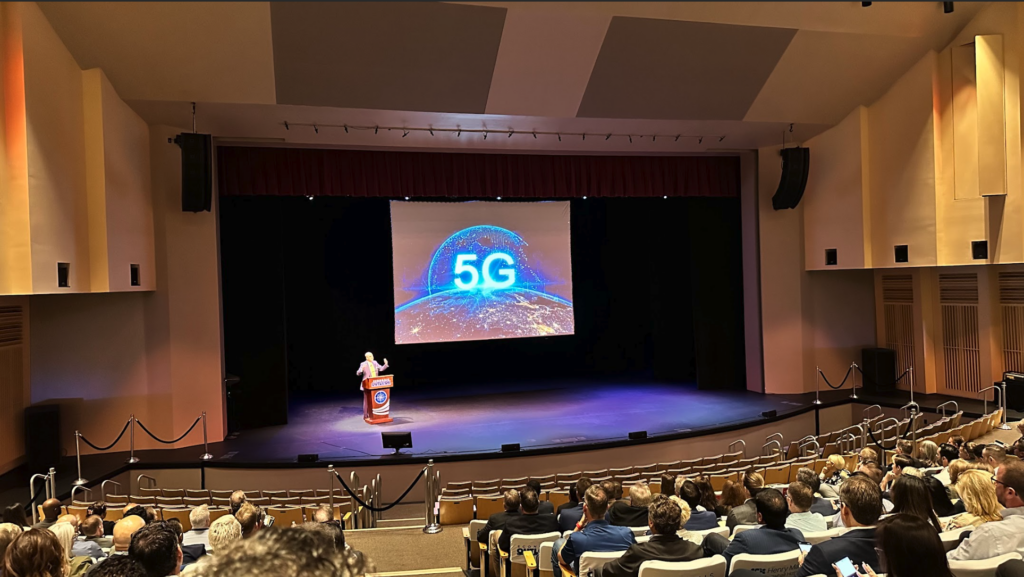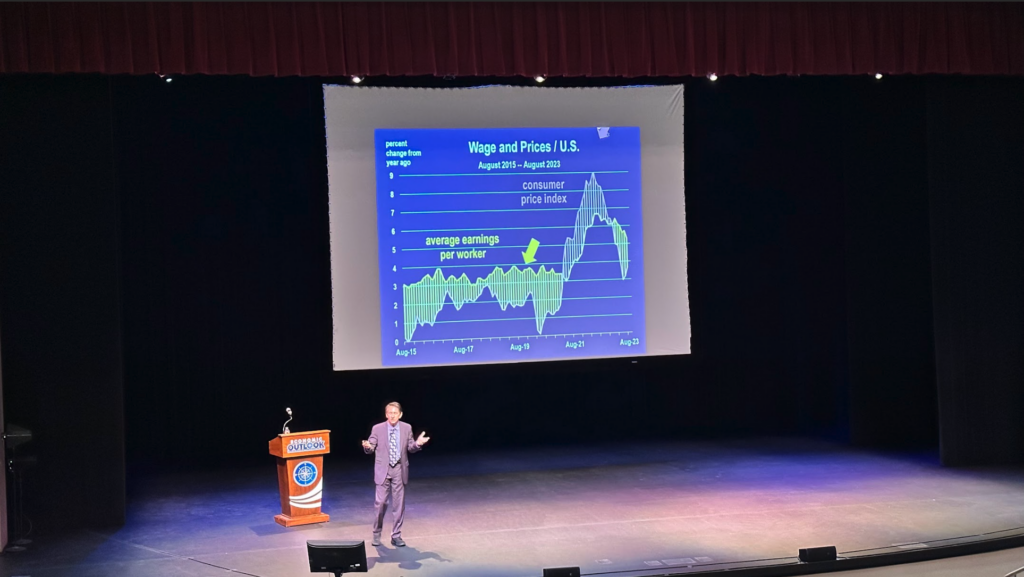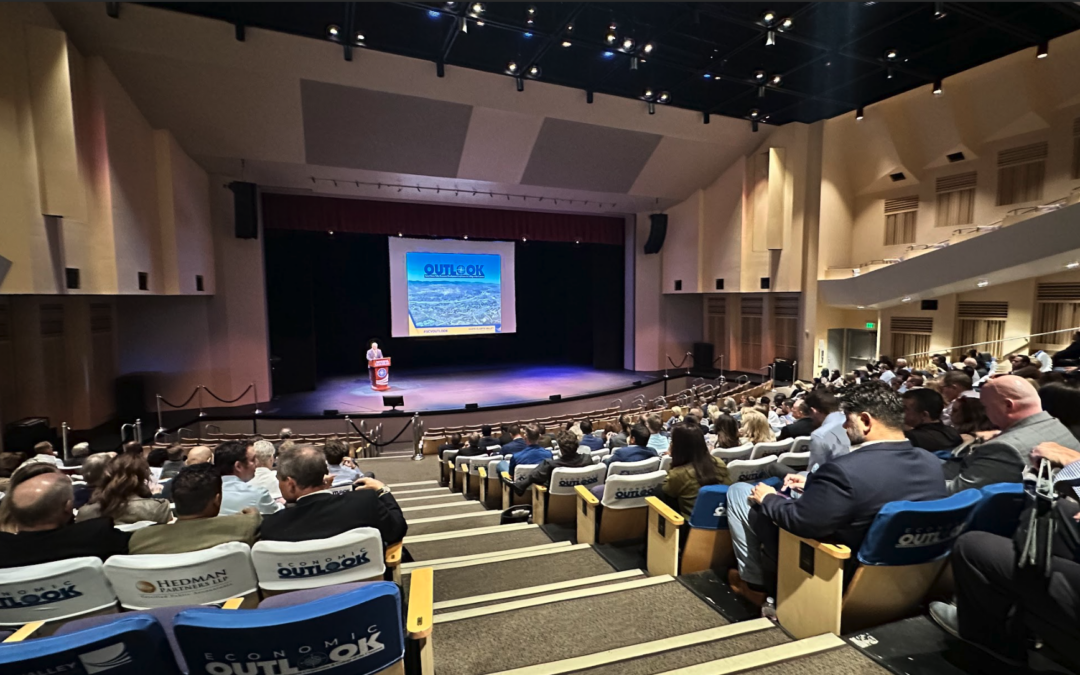NetActuate was pleased to be a sponsor of the Santa Clarita 2023 Economic Outlook conference, organized by the Santa Clarita Valley Economic Development corporation and the College of the Canyons. The conference brought together leaders in business, government, and academia to take an in-depth look at the economy and global trends.
A highlight of the conference was the keynote by leading global futurist and author Jack Uldrich. While Uldrich doesn’t directly consider himself a technologist, his perspective on where the world is going (and the lessons we can learn about how we’ve gotten there) had tremendous parallels to our own work at NetActuate. His strong focus on core communication technologies and connecting the world’s people together via the internet mirrors our own.

As a company local to Santa Clarita with global reach that does business in over 40 markets worldwide, our platform hosts many large providers that in turn, power millions of businesses that serve tens of millions of customers around the world. NetActuate’s goal is to meet our customers where they are locally, at our edge. In technical terms, we have an internal goal of reducing our latency and expanding our network to be within 10 ms of every customer.
I’ve written in the past about how transformational the internet has been, as well as what the role of the network operator in facilitating its continued growth. It’s another reason why my title on LinkedIn is “Chief Plumber.” Dealing with the plumbing, the pathways, the pipes of global networks brings me tremendous satisfaction both at a personal and professional level. I am always in awe of how our work at NetActuate facilitates the innovation of our customers.
I often think of how far we’ve come as a people and the pace of innovation. Just in the last 200 years – we’ve gone from steamships and telegrams to real time communication anywhere and flying across the world in just hours. And that continues to accelerate, with innovations in every sector that will continue to change and redefine our lives. It’s an exciting time to be alive, and every day brings new opportunities and challenges.
I have been fortunate enough to travel the world. I’ve had the opportunity to cross not just time zones, but also cultures and people. I enjoy every chance I get to see and consider different perspectives. As a developer and engineer, I know the power of another set of eyes. I always appreciate a colleague asking a question in a different way to come to a new and exciting solution. One of the biggest takeaways from Uldrich’s presentation is understanding our own bias: we in the West often view the world from a distinct perspective.
He illustrated this by using the standard world map you can find in every classroom in America, and asked us to reflect on it. We see ourselves and our continent on the left. We are aware of Europe and Asia and all the rest, but our bias “roots” them visually in our worldview.
Uldrich pointed out that from space, there is no direction. The world map could just as easily be flipped. And when you do this, consider that three billion people from the new “half of the map” will come online in the next decade.

That’s three billion people that all have their own ideas, their own inspiration, their own perspective. They will bring a new desire to innovate, contribute, and build their own vision of success. We can consider this from many perspectives, especially what that means for businesses. As a facilitator, I like to consider that these new perspectives and insights are rooted in an ideology that I can’t even imagine.
I appreciated that Uldrich urged each of us to spend more time thinking about the future – even if it’s for a few minutes a week. It’s an exciting time to be in this space, and our mission to connect is more important than ever.
The next major topic at the conference was the Economic Outlook Study presented by Dr. Mark Schniepp. His prevailing theme was “Stormy weather is moderating. Is recession still likely?” Here, Dr. Schniepp walked us through his extensive report, available in the 2023 Economic Outlook Book. What I appreciated most was the national to local perspective. An excerpt from his executive summary concludes:
Fortunately, current economic conditions are not yet supporting the widespread expectation of inevitable recession this year. In March of 2023, the majority of economists forecast a U.S. recession in 2023, and for many good reasons.
The sharpest increase in interest rates in 40 years, the inverted yield curve, the contracting of manufacturing, and the dismal ratings in American polls regarding government leadership and the direction of the country have not tipped over the U.S. economy. Amid all of the economic clouds, there’s no storm yet.
Consumers have faced sharply rising prices for food, gasoline and shelter over the last 18 months. They’ve seen massive layoffs from Amazon, Meta, Google, Salesforce, Twitter, and Yahoo over the last 12 months.
They’ve witnessed global instability in Afghanistan, Eastern Europe, France, and now they are seeing tensions rise between China and Taiwan, and us. No wonder they generally expect a recession within the next 12 months.
However, general sentiment about the economy has just recently improved. There is also a clear improvement on inflation. Layoffs have now moderated. The long perceived recession in 2023 has not arrived, and the likelihood of expected recession moderated in June and July.
Dr. Schniepp continued to walk attendees through both why and how our economic environment has changed. He also touched on what economists had forecasted in 2022 and what the current predictions are for 2024 and beyond.

NetActuate is a company with a footprint in markets across the globe – with a diverse set of customers doing business in many different ways. However, we’ve been dealing with rising costs and the economy in many real ways. Things are more expensive. Power costs in Europe are up 400% in some cases. The supply chain and demand for chips to power AI is powering a new “gold rush.” This means that the CapEx and OpEx budgets to operate just a few AI-ready servers can be well into the hundreds of thousands, shocking finance departments and budgets everywhere.
For us, it also highlights one of the ways that NetActuate operates differently. We partner with our customers to understand their infrastructure and their needs. We are the most successful when we identify a cost per transaction of their product or service, and bring the power of the global market to bear.
For some customers, that could be as simple as averaging costs over multiple markets. Other times, our engineers innovate new ways to deliver the same performance with greater speed and capacity, making the overall cost lower. Our network technologists are always identifying new and more efficient paths to move data, lowering costs and reducing latency. We help our customers effectively navigate the complexities of operating globally to make infrastructure costs less damaging to the bottom lines. Our experts can navigate multiple currencies and multiple vendors at global scale so our customers don’t have to.
The spoiler, by the way, from Dr. Schniepp’s presentation is that the recession is officially canceled. Only time will bear that out, and in the meantime, we all continue to move forward with great optimism.
If you find yourself asking these questions or dealing with global infrastructure, reach out and speak with us.
